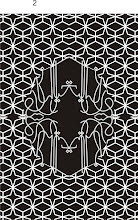The poems of Fraaz Mahmud spring from a heart which needs nothing from anyone, a heart that is filled with innocent sentiments about personal desires and dreams. He uses pen and paper to give vent to a sense of loss and loneliness, but he does not seem suffocated, rather Fraaz lives in close proximity with his ideal. He believes in silent efforts and suffering in silence. Love for society, in particular, runs in the poems like blood.
For instance, Abhi Dam Baqi Hai is one such example. It is composed in the memory of a child who scarcely survives in a road accident. Fraaz feels drenched and dissociated at the spiritless attitude of the fellow beings who appear hardly inclined to rescue the child. There is a generalised impression in the poem as he speaks like a commentator whose main concern is to study human behaviours and reactions.
People in our age do not seem to be the members of an integrated community. They live as individuals, holding meager amount of collective approach and assume as a crowd at some point. It is mostly an outcome of the vested interests that they wish to serve. This is why our action is devoid of vigour and enthusiasm.
Fraaz, however, does not promote pessimistic note in his poems. He shares his personal positive aptitude with a reader with an expectation that it will create a universal appeal. He follows the theory of "Values and Self-satisfaction" which opines a fact that literary values are a must to nurture productive approach in a society. Unlike traditional Urdu poets, Fraaz does not put much emphasis on a conventional poetic expression related to love poems. He speaks less on 'love encounters' rather he presents a word picture of a person who absorbs shocks of love with realistic grace and intactness.
Bitterness, heat, afternoon time, restrictions or so-called norms and values, resentfulness and a questioning tone, all are dealt with by the poet with maturity of thoughts and seasoned eagerness of imagination.
Sheer idealism and rebellious approach are negated consciously to project the respect and consideration that we are supposed to undertake as members of a cultured community. The poet condemns extremism and anti-social learning that exist in individuals. He is a flag-bearer of honesty, civility and seriousness of cause in daily-life patterns. Peace and positive possibilities need to be made trends of the time. The following verse aptly expresses the views of Fraaz: Deta hai dunya me duhai ye Fraaz Har jagah parchm-e-aman ko lehraya jaey It reveals a fact that the poet is socialistic in ideas and strongly intends to stir up such sentiments as regular disposition of modern man.
This could be a deliberate effort of the poet to maintain him as a humanitarian soul whose chief call lies in establishing speculative approach of money, sacrifice and service. To conclude, we may say that Fraaz Mahmud is, no doubt, a fresh addition to the comity of poets. The simplicity of expression and vividness in imagination both prompt a reader to buy and relax Khayal Kahani for the weekend.
Khayal Kahani’s review by Agha Ghazanfar Hussain

